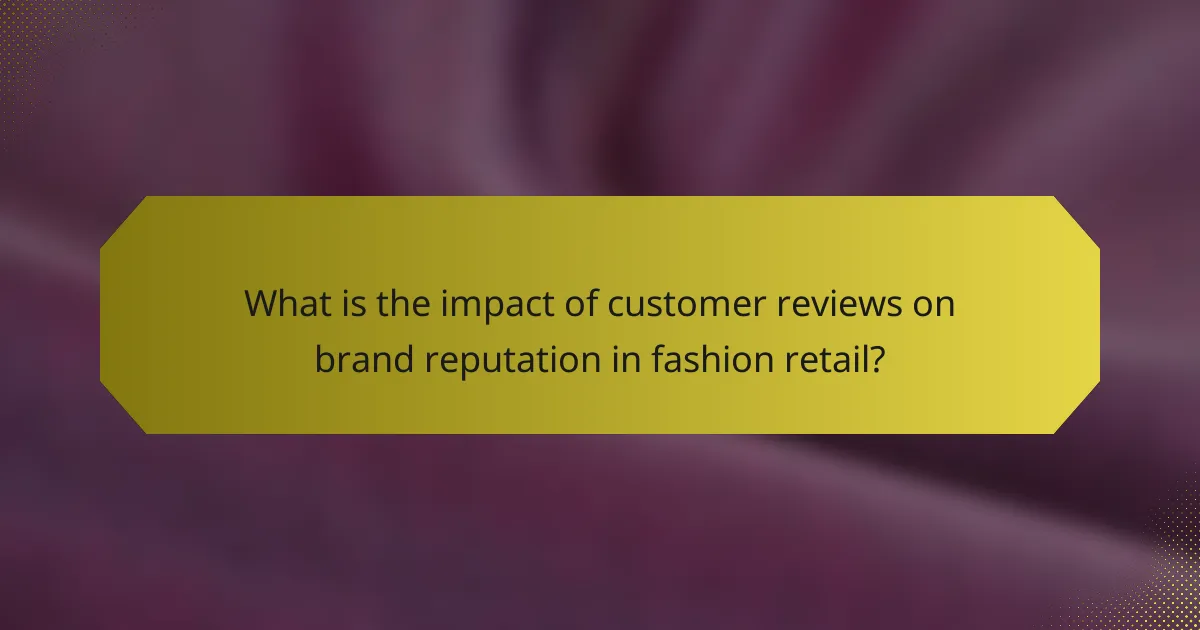Customer reviews play a crucial role in shaping brand reputation within the fashion retail sector. Positive reviews enhance brand credibility, attract new customers, and serve as social proof that influences purchasing decisions, while negative reviews can harm brand perception and reduce sales. Effective management of customer feedback, including prompt responses to reviews and utilization of analytics tools, is essential for maintaining a positive brand image and fostering customer loyalty. Future trends indicate a growing reliance on artificial intelligence for analyzing feedback and a shift towards personalized and multimedia-rich review experiences, further emphasizing the importance of customer reviews in fashion retail.

What is the impact of customer reviews on brand reputation in fashion retail?
Customer reviews significantly impact brand reputation in fashion retail. Positive reviews enhance brand credibility and attract new customers. They serve as social proof, influencing purchasing decisions. A study by BrightLocal found that 91% of consumers read online reviews before making a purchase. Negative reviews can damage brand perception and lead to decreased sales. According to a survey by Podium, 93% of consumers say online reviews affect their buying decisions. Brands must actively manage customer feedback to maintain a positive reputation. Engaging with reviews, both positive and negative, shows customers that their opinions are valued. This interaction can strengthen customer loyalty and improve overall brand image.
How do customer reviews influence consumer perception of fashion brands?
Customer reviews significantly influence consumer perception of fashion brands. Positive reviews enhance brand reputation and trustworthiness. They provide social proof, indicating that others have had satisfactory experiences. According to a 2021 survey by BrightLocal, 79% of consumers trust online reviews as much as personal recommendations. Negative reviews can deter potential customers and harm brand image. A study by Harvard Business School found that a one-star increase in Yelp ratings can lead to a 5-9% increase in revenue for restaurants, illustrating similar impacts in fashion retail. Customer reviews shape expectations and inform purchasing decisions, ultimately affecting brand loyalty and sales.
What aspects of customer reviews are most impactful on brand reputation?
The aspects of customer reviews most impactful on brand reputation include overall rating, review sentiment, and response from the brand. Overall rating directly influences consumer perception. A higher average rating correlates with increased trust. Review sentiment reflects the emotional tone of the feedback. Positive sentiment enhances brand image, while negative sentiment can damage it. Brand response to reviews plays a crucial role in reputation management. Timely and constructive responses can mitigate negative reviews. According to a study by BrightLocal, 87% of consumers read online reviews for local businesses, indicating their importance. Additionally, 73% of consumers trust a business more if it responds to reviews. These statistics underline the significance of these aspects in shaping brand reputation.
How do positive and negative reviews differ in their effects on brand perception?
Positive and negative reviews significantly differ in their effects on brand perception. Positive reviews enhance brand image and build trust among consumers. They often lead to increased customer loyalty and higher sales. In contrast, negative reviews can damage brand reputation and deter potential customers. Negative feedback tends to spread faster through social media and online platforms. Research indicates that 72% of consumers trust online reviews as much as personal recommendations. Furthermore, 86% of consumers read reviews for local businesses. This data illustrates the profound impact both types of reviews have on consumer decision-making.
Why are customer reviews critical in the fashion retail industry?
Customer reviews are critical in the fashion retail industry because they significantly influence purchasing decisions. Studies show that 93% of consumers read online reviews before making a purchase. Positive reviews enhance brand trust and credibility. They provide social proof, reassuring potential buyers about product quality. Negative reviews can deter customers and harm brand reputation. Fashion retailers often rely on reviews for feedback on sizing, fit, and style. This feedback helps improve product offerings and customer satisfaction. Overall, customer reviews shape consumer perceptions and drive sales in the fashion retail sector.
What role do customer reviews play in the decision-making process of consumers?
Customer reviews significantly influence the decision-making process of consumers. They provide insights into product quality and customer satisfaction. Reviews help potential buyers gauge the experiences of previous customers. According to a study by BrightLocal, 91% of consumers read online reviews before making a purchase. Positive reviews can enhance a brand’s reputation, while negative reviews can deter potential customers. Consumers often trust reviews as much as personal recommendations. This trust can lead to increased sales or lost opportunities for brands. Overall, customer reviews serve as a critical factor in shaping consumer choices in retail.
How do customer reviews compare to other forms of brand communication?
Customer reviews are often more influential than other forms of brand communication. They provide authentic insights from real customers. This authenticity builds trust and credibility. Studies show that 79% of consumers trust online reviews as much as personal recommendations. In contrast, traditional advertising can be perceived as biased. Brands control their messaging in ads, which may lead to skepticism. Customer reviews, however, reflect genuine experiences. This makes them a powerful tool in shaping brand reputation. Overall, customer reviews significantly impact consumer decision-making compared to other communication forms.

How can fashion retailers effectively manage customer reviews?
Fashion retailers can effectively manage customer reviews by implementing structured response strategies. They should actively monitor review platforms to stay updated on customer feedback. Promptly responding to both positive and negative reviews fosters customer engagement. Retailers can use customer feedback to improve products and services, enhancing overall satisfaction. Training staff to handle reviews professionally is essential for maintaining brand reputation. Utilizing review analytics tools can help identify trends and common issues. This data-driven approach allows retailers to address concerns proactively. According to a 2020 study by BrightLocal, 79% of consumers trust online reviews as much as personal recommendations, highlighting the importance of effective review management.
What strategies can fashion brands implement to encourage positive reviews?
Fashion brands can implement several strategies to encourage positive reviews. Firstly, they can enhance customer experience by providing high-quality products and excellent customer service. A survey by BrightLocal found that 84% of consumers trust online reviews as much as personal recommendations. Secondly, brands can actively request feedback from satisfied customers after purchase. This can be done through follow-up emails or incentivizing reviews with discounts on future purchases. Thirdly, showcasing positive reviews on their websites and social media can build trust and encourage more customers to share their experiences. Additionally, responding to reviews, both positive and negative, shows customers that their opinions are valued. According to a study by ReviewTrackers, 53% of customers expect businesses to respond to their reviews within a week. Lastly, creating a community around the brand, such as through social media engagement, can foster loyalty and increase the likelihood of positive reviews.
How can brands respond to negative reviews to mitigate damage to their reputation?
Brands can respond to negative reviews by acknowledging the issue and providing a solution. This approach shows customers that the brand values feedback. Timely responses are crucial; addressing reviews quickly can prevent further damage. Personalizing responses makes customers feel heard and appreciated. Offering compensation, such as refunds or discounts, can help regain customer trust. Encouraging satisfied customers to leave positive reviews can balance the negative feedback. Monitoring reviews regularly allows brands to stay informed about customer sentiment. According to a study by BrightLocal, 85% of consumers trust online reviews as much as personal recommendations. This highlights the importance of effective responses in maintaining a positive brand reputation.
What tools are available for monitoring and analyzing customer reviews?
Tools available for monitoring and analyzing customer reviews include platforms like ReviewTrackers, Trustpilot, and Google Alerts. ReviewTrackers aggregates reviews from multiple sources, providing insights into customer feedback trends. Trustpilot allows businesses to collect and analyze reviews to enhance brand reputation. Google Alerts notifies users about new reviews or mentions online. Additional tools include Hootsuite and Sprout Social, which monitor social media mentions and reviews. These tools help brands understand customer sentiment and improve their reputation in the fashion retail sector.
Why is authenticity important in customer reviews for fashion brands?
Authenticity is crucial in customer reviews for fashion brands because it builds trust with potential buyers. Genuine reviews provide real insights into product quality and customer experiences. According to a survey by BrightLocal, 79% of consumers trust online reviews as much as personal recommendations. Authentic reviews can significantly influence purchasing decisions, as 85% of consumers read up to 10 reviews before making a choice. Fashion brands with authentic reviews often see higher engagement and loyalty from customers. This connection can enhance brand reputation and drive sales in a competitive market.
How can brands ensure the authenticity of customer reviews?
Brands can ensure the authenticity of customer reviews by implementing verification processes. These processes can include requiring proof of purchase before allowing a review. Brands can also utilize third-party review platforms that authenticate user identities. Monitoring for suspicious activity, such as multiple reviews from the same IP address, can help identify fraudulent reviews. Additionally, encouraging detailed feedback can lead to more genuine insights. Transparency in displaying review guidelines fosters trust among consumers. Research shows that 70% of consumers trust reviews more when they see verified purchase badges. By taking these steps, brands can enhance the credibility of their customer reviews.
What impact does the perceived authenticity of reviews have on brand trust?
Perceived authenticity of reviews significantly impacts brand trust. Authentic reviews enhance consumer confidence in a brand. When customers believe reviews are genuine, they are more likely to trust the brand. A study by Nielsen found that 92% of consumers trust recommendations from friends and family more than any other form of advertising. Additionally, reviews that appear authentic can increase purchase intentions by 70%. Conversely, perceived inauthenticity can lead to skepticism and reduced trust. Brands that foster genuine customer feedback typically see improved loyalty and reputation.

What are the future trends regarding customer reviews in fashion retail?
Future trends regarding customer reviews in fashion retail include increased integration of artificial intelligence and personalization. Retailers will leverage AI to analyze customer feedback more effectively. This technology will help identify trends and sentiments in real-time. Personalized review requests will become common, targeting specific customer segments. Visual content, such as photos and videos, will gain prominence in reviews. Consumers increasingly prefer multimedia over text-based feedback. Additionally, platforms will enhance transparency by displaying verified purchase badges. This builds trust in the authenticity of reviews. Social media will continue to influence customer review dynamics, amplifying brand reputations. Overall, these trends indicate a shift towards more interactive and trustworthy customer review experiences in fashion retail.
How is technology changing the landscape of customer reviews in fashion?
Technology is transforming customer reviews in fashion by enhancing accessibility and interactivity. Online platforms now allow customers to share experiences instantly. Social media amplifies these reviews, reaching wider audiences rapidly. Artificial intelligence analyzes sentiments and trends in real-time. This data helps brands respond promptly to customer feedback. Virtual fitting rooms enable customers to share visual reviews. Augmented reality tools allow users to see products in real-life settings. These advancements increase transparency and trust in fashion brands.
What role do social media and influencers play in shaping customer reviews?
Social media and influencers significantly shape customer reviews by amplifying brand visibility and credibility. Influencers often have large followings, which means their opinions can reach a vast audience quickly. Their endorsements or critiques can sway consumer perceptions and drive engagement with brands. Studies indicate that 49% of consumers depend on influencer recommendations for product information. Additionally, social media platforms allow users to share reviews instantly, creating a feedback loop that influences others’ purchasing decisions. This dynamic interaction enhances the overall impact of customer reviews on brand reputation in the fashion retail sector.
What best practices should fashion retailers follow for managing customer reviews?
Fashion retailers should actively monitor and respond to customer reviews. Engaging with customers builds trust and shows that their opinions matter. Retailers should encourage reviews by sending follow-up emails after purchases. This practice increases the volume of feedback received. Additionally, retailers must address negative reviews promptly and professionally. Responding to concerns can mitigate potential damage to brand reputation. Retailers should showcase positive reviews on their websites and social media. Highlighting customer satisfaction can enhance credibility. Analyzing review trends helps identify areas for improvement. Understanding customer sentiments can guide product development and marketing strategies.
How can brands create a culture of feedback to enhance their reputation?
Brands can create a culture of feedback by actively encouraging customer input. This involves implementing multiple channels for feedback, such as surveys, social media, and direct communication. Regularly acknowledging and responding to feedback can foster trust and engagement. Training employees to handle feedback constructively is essential. Additionally, integrating feedback into decision-making processes can demonstrate that customer opinions matter. According to a study by Zendesk, 92% of consumers feel more loyal to brands that respond to their feedback. This shows that a feedback culture can significantly enhance brand reputation.
What common pitfalls should fashion retailers avoid in handling customer reviews?
Fashion retailers should avoid ignoring negative reviews. Ignoring feedback can lead to customer dissatisfaction. It is essential to respond to all reviews promptly. Retailers should also avoid being defensive in their responses. A defensive tone can alienate customers. Additionally, retailers should not filter out negative reviews. Transparency builds trust with potential buyers. Another pitfall is failing to analyze review trends. Understanding common issues can improve products and services. Lastly, retailers should avoid generic responses. Personalized replies show customers that their opinions matter.
The main entity of the article is “customer reviews” within the context of “brand reputation” in the fashion retail industry. The article explores the significant impact of customer reviews on brand credibility, consumer perception, and purchasing decisions. It highlights the differences between positive and negative reviews, the critical aspects influencing brand reputation, and effective strategies for managing customer feedback. Additionally, it discusses the importance of authenticity in reviews, the role of technology and social media, and best practices for retailers to foster a culture of feedback and enhance their overall reputation.
